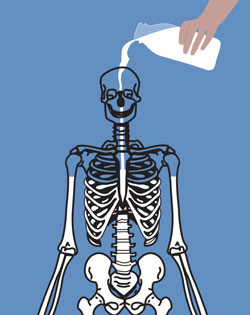Thursday, February 17, 2011
Minerals
Minerals are essential nutrients for every living cell in the human body. Defined in the study of human nutrition as all the inorganic elements or molecules required for life, minerals assist in body functions such as producing energy, growing, and healing. Minerals are required for fluid balance, blood and bone development, maintaining a healthy nervous system, and regulating muscles, including heart muscles. Minerals, like vitamins, function as coenzymes. They participate in all enzyme reactions in the body and help in the assimilation and use of vitamins and other nutrients.
Minerals occur either as bulk minerals (macrominerals) or trace minerals (microminerals). The body needs more bulk minerals than it does trace minerals, although both are essential for health. Minerals are consumed in food from plants and plant-eating animals. These sources of minerals develop in a sequence that takes millions of years, beginning with rock formation, the breakdown of rocks into mineral salts, and the assimilation of these salts into soil that nourishes edible plants.
Recommended daily allowances exist for a number of minerals, such as calcium. However, minimum daily requirements for some minerals such as boron, chromium, and molybdenum, do not exist. The essential bulk minerals include:
 Calcium—essential for strong bones and teeth, healthy gums, and bone growth and mineral density in children. Calcium helps regulate the heart rate and nerve impulses, lower cholesterol, prevent atherosclerosis, develop muscles, and prevent muscle cramping. Calcium is an important component of blood clotting. Calcium and phosphorus are closely related minerals that should be balanced. About 99 percent of calcium and 85 percent of phosphate occur in the skeleton as crystals of calcium phosphate. Both nutrients occur in a variety of foods such as milk, eggs, and green, leafy vegetables. Calcium deficiency due to lack of dietary calcium occurs only rarely and is often due to vitamin D deficiency, because vitamin D is required for efficient absorption of dietary calcium. Significant depletion of calcium stores can lead to osteoporosis.
Calcium—essential for strong bones and teeth, healthy gums, and bone growth and mineral density in children. Calcium helps regulate the heart rate and nerve impulses, lower cholesterol, prevent atherosclerosis, develop muscles, and prevent muscle cramping. Calcium is an important component of blood clotting. Calcium and phosphorus are closely related minerals that should be balanced. About 99 percent of calcium and 85 percent of phosphate occur in the skeleton as crystals of calcium phosphate. Both nutrients occur in a variety of foods such as milk, eggs, and green, leafy vegetables. Calcium deficiency due to lack of dietary calcium occurs only rarely and is often due to vitamin D deficiency, because vitamin D is required for efficient absorption of dietary calcium. Significant depletion of calcium stores can lead to osteoporosis. Magnesium—assists in the utilization of calcium and potassium, and functions in enzyme reactions to produce energy. Magnesium protects the lining of arteries and helps form bones. It helps prevent cardiovascular disease, osteoporosis, and some cancers. By acting with vitamin B6, magnesium can help prevent or dissolve calcium oxylate kidney stones, the most common kind of stones. Dietary magnesium deficiency is uncommon, but may occur in chronic alcoholics, persons taking diuretic drugs, and as a result of severe, prolonged diarrhea.

Sodium—sodium deficiency (hyponatremia) is a serious deficiency, arising most often after excessive losses of body fluid (dehydration) during prolonged and severe diarrhea or vomiting. Sodium and potassium are electrolytes that must be balanced in the body. Since most people get more than enough salt in the diet, potassium may be needed to balance it. Together, these minerals control fluid balance through a mechanism called "the sodium/potassium pump." Prolonged imbalances in sodium and potassium can contribute to heart disease.
Potassium—important for a healthy nervous system and a steady heart rate, helps to prevent stroke, and, with sodium, is critical in maintaining fluid balance. Potassium, an electrolyte, must be balanced with sodium. Potassium deficiency is usually associated with sodium deficiency and both potassium and sodium deficiency are associated with dehydration stemming from excessive losses of body fluid.

Phosphorus—helps form bones and teeth, supports cell growth, and regulates heart muscle contraction and kidney function. Phosphorus converts food to energy and supports the utilization of vitamins. Deficiency is rare because phosphate is plentiful in plant and animal foods and is efficiently absorbed from the diet. Phosphorus is closely related to calcium and the two minerals should be in balance with each other and with magnesium. Deficiency in one will affect all and will ultimately have an unwanted effect on body function. Calcium and phosphorus are stored in the bones as crystals of calcium phosphate. Milk, eggs, and green, leafy vegetables are rich in calcium and phosphate.
Trace minerals essential for human health include:
Boron—required for healthy bones, brain functin, alertness, and the metabolism of bulk minerals such as calcium, phosphorus, and magnesium. Deficiencies are rare except in aging, when supplementation may help absorb calcium. A deficiency in boron is associated with vitamin D deficiency. Boron supplements can improve calcium levels as well as vitamin D levels, and can help prevent osteoporosis in postmenopausal women by promoting calcium absorption.
Chromium—required for maintaining energy levels. Chromium helps metabolize glucose and stabilize glucose levels. It helps the body manufacture and use cholesterol and protein.
 Copper—helps form healthy bones, joints, and nerves as well as hemoglobin and red blood cells. Copper contributes to healing, energy production, taste, and hair and skin color. It is essential in forming collagen for healthy bones and connective tissue, and helps prevent osteoporosis. Except in osteoporosis, copper deficiency is rare, although dramatic changes in copper metabolism occur in two serious genetic diseases, Wilson disease and Menkes' disease.
Copper—helps form healthy bones, joints, and nerves as well as hemoglobin and red blood cells. Copper contributes to healing, energy production, taste, and hair and skin color. It is essential in forming collagen for healthy bones and connective tissue, and helps prevent osteoporosis. Except in osteoporosis, copper deficiency is rare, although dramatic changes in copper metabolism occur in two serious genetic diseases, Wilson disease and Menkes' disease.Germanium—helps improve the delivery of oxygen to tissues and remove toxins and poisons from the body. Germanium gives garlic its natural antibiotic properties.
Iodine—helps promote healthy physical and mental development in children. Iodine is required for thyroid gland function and metabolizing fats. Iodine deficiency is a public health problem in parts of the world that have iodine-deficient soils. Iodine is needed to make thyroid hormone, which has a variety of roles in human embryo development. A deficiency during pregnancy can cause serious birth defects. Deficiency in adults can result in an enlarged thyroid gland (goiter) in the neck.
Iron—critical in the production of hemoglobin, the oxygen-carrying protein in red blood cells, and myoglobin found in muscle tissue. Iron is essential for important enzyme reactions, growth, and maintaining a healthy immune system. In the blood, iron is found in larger amounts than any other mineral. Iron deficiency causes anemia (low hemoglobin and reduced numbers of red blood cells), which results in tiredness and shortness of breath because of poor oxygen delivery.
Manganese—essential for metabolizing fat and protein, regulating blood glucose, and supporting immune system and nervous system function. Manganese is necessary for normal bone growth and cartilage development. It is involved in reproductive functions and helps produce mother's milk. Along with B vitamins, manganese produces feelings of well-being. Deficiency can lead to convulsions, vision and hearing problems, muscle contractions, tooth-grinding and other problems in children; and atherosclerosis, heart disease, and hypertension in older adults.
Molybdenum—found in bones, kidneys, and liver. Only extremely small amounts are needed to metabolize nitrogen and promote proper cell function. Molybdenum is present in beans, peas, legumes, whole grains, and green leafy vegetables. A diet low in these foods can lead to mouth and gum problems and cancer.
Selenium—an important antioxidant that works with vitamin E to protect the immune system, heart, and liver, and may help prevent tumor formation. Selenium deficiency occurs in regions of the world where soils are selenium-poor and low-selenium foods are produced. Premature infants are naturally low in selenium with no known serious effects.
 Silicon—helps form bones and connective tissue, nails, skin, and hair. Silicon is important in preventing cardiovascular disease.
Silicon—helps form bones and connective tissue, nails, skin, and hair. Silicon is important in preventing cardiovascular disease.Sulfur—disinfects the blood and helps to rid the body of harmful bacteria and toxic substances.
Vanadium—vital to cell metabolism, and helps reduce cholesterol and form healthy bones and teeth. Vanadium functions in reproduction. Deficiencies may be associated with heart and kidney disease and reproductive disorders. Vanadium deficiency may be associated with infant mortality.
Zinc—important in the growth of reproductive organs and regulation of oil glands. Zinc is required for protein synthesis, immune system function, protection of the liver, collagen formation, and wound healing. A component of insulin and major body enzymes, zinc helps vitamin absorption, particularly vitamins A and E. Deficiency is rare.
Subscribe to:
Post Comments (Atom)

Aspire Pilates Training Center & Spa
2464 W. 12600 S. Suite 190
Riverton, Utah 84065
801-302-5720
www.aspireptc.com
About Me
Blog Archive
-
▼
2011
(42)
-
▼
February
(34)
- 8 Ways to Stick to Your Diet While Friends Indulge
- Keep Your Joints Healthy
- Almond Crunch Arbonne Protein Shake
- Importance of Sleep
- Vitamin C
- Crispy Nut Butter Treats
- Sweeteners
- Water
- Dietary fiber: Essential for a healthy diet
- Piña Colada Arbonne Protein Shake
- Aerobic exercise: How to warm up and cool down
- Minerals
- Gluten Free & Vegan Peppermint Patties
- Face the Fats
- Finishing up Week 2 of the 28 Day Challenge....
- Happy Valentine's!
- What is YOUR Goal? ...
- Digestive Enzymes
- Nutty Apple Cinnamon Arbonne Protein Shake
- Relaxation
- Stress
- B Vitamins
- Arbonne Protein Powder Pancakes
- Good Carbs vs Bad Carbs
- First Week of 28 Day Challenge....
- Detoxification
- Probiotics
- Pumpkin Spice Protein Shake
- Cardio vs Strength Training
- Vitamin D
- Perfect Form
- Arbonne Protein Bars Recipe
- Monster Lo-Carb Energy Drink Vs Arbonne Fizz-tabs ...
- Proteins
-
▼
February
(34)
Followers
Powered by Blogger.





2 comments:
Health Tips In Urdu
hair loss treatment-Girte Kamzor Balon Ka ilaj
Sex Timing Medicine
decrease the enlarged abdomen-motapay ka ilaj
increase sex timing at home tips
Constipation Treatment-qabz ka ilaj
Krona Various Safety Measures
weak Brain Treatment-dimagi kamzori ka ilaj
Health Tips In Urdu
hair loss treatment-Girte Kamzor Balon Ka ilaj
Sex Timing Medicine
decrease the enlarged abdomen-motapay ka ilaj
increase sex timing at home tips
Constipation Treatment-qabz ka ilaj
Krona Various Safety Measures
weak Brain Treatment-dimagi kamzori ka ilaj
Post a Comment